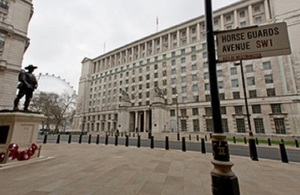New service to provide enhanced support to personnel leaving the military
The Defence Transition Service will support people as they transition to civilian life.

Military personnel and their families are to receive enhanced support from the MOD as they re-join civilian life, the Defence Secretary has announced today.
The expanded support includes the launch a new organisation, the Defence Transition Services, which will provide comprehensive support to service leavers.
Dedicated MOD staff across the country will help those few service leavers who may struggle as they transition into civilian life. More responsibility will also be placed on commanders to identify those who are likely to face the greatest challenges in making a successful transition.
Previously, transition support was mainly focussed on ensuring that personnel find jobs when leaving service, through the MOD’s longstanding and successful Career Transition Partnership. Now, personnel and their families will also receive expanded support and guidance, including in areas such as personal finance, accessing healthcare, housing costs and paying council tax.
The new measures announced today also include:
- Regionally based teams with dedicated staff will provide support to individuals and their families assessed as facing the greatest challenges during the transition stage
- Placing responsibility on a service person’s unit to assess each service leaver’s preparedness for transitioning into civilian life. Those assessed as someone who may struggle in civilian life will then be referred to Defence Transition Services
- New guidance for all service leavers on issues to consider when leaving the armed forces, including housing, finances and access to healthcare, as well as the crucial issue of their family’s transition away from being an integral part of Service life
- A new Defence Holistic Transition Policy
Bespoke support from the DTS is provided for a member of the armed forces while they approach their date of discharge and will not stop start when they leave the military. The support can continue for as long as it is needed.
Defence Secretary Ben Wallace said:
We have a duty of care to our service personnel and veterans and today’s stepped up support will help ensure that no veteran is left behind.
While the vast majority of those who leave the armed forces go on the lead happy, healthy and successful lives, we need to do everything we can for those who do struggle.
Providing more comprehensive support at the crucial transition stage will help in giving service leavers an extra boost when they re-join civilian life.
A successful transition is key for the majority of service leavers to ensure they build successful lives as civilians. The MOD recognises its crucial role in ensuring its service leavers are as well prepared and supported as possible to re-enter civilian society.
Today’s announcement also delivers against the government-wide strategy for Our Veterans, ensuring the approximate 15,000 service leavers each year contribute fully to society and setting the standard for future recruitment to the armed forces.
The new initiatives, which will be run by the MOD, will ensure that service leavers are fully considering all relevant aspects of their departure from the Armed Forces, the effect of that departure on their families, and the appropriate steps to be taken to ensure that the transition, both in the short and long term, is as successful as possible.
Providing an extra layer of care for those preparing to leave the military, DTS will deliver specialist support for personnel who are most likely to face challenges as they adjust to civilian life. Service leavers will be offered unique solutions to the challenges they face, including help with employment.
Minister for Defence People and Veterans Johnny Mercer said:
A career in the Armed Forces provides individuals with immense skills and experience which means that most are successful on civvie street.
But some do struggle and the introduction of our new transition policy and the setting up of the new Defence Transition Services will mean that more comprehensive guidance and support is available both during career and during the transition phase.
This tailored and stepped up support will help personnel to not just find a job, but cope better with other areas of civilian life, such as managing finances, accessing healthcare and finding housing.
The DTS will also be responsible for providing signposting and connecting with external support from other government departments and public bodies, as well as trusted charities.
The increased support comes after the Government established the Office for Veterans Affairs, bringing together all relevant Government departments to ensure that veterans are receiving the support they need and deserve.